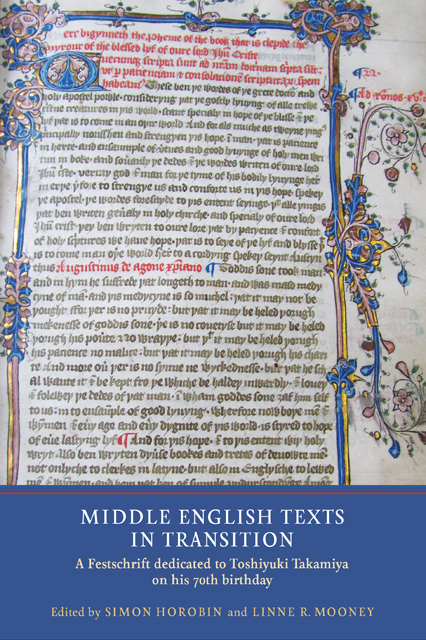 Middle English Texts in Transition
Middle English Texts in Transition Published online by Cambridge University Press: 11 March 2023
Oxford, Corpus Christi College, MS 201 (F) is an early fifteenth-century manuscript of Piers Plowman, which presents an idiosyncratic and textually divergent copy of the poem. But while textual critics have been tempted to discard it as an unreliable witness, with numerous erratic and evidently scribal readings, its status as one of only two surviving witnesses to the alpha textual tradition of the B version means that it cannot be ignored, especially in cases where the other alpha witness, Bodleian Library, MS Rawlinson Poetry 38 (R), is clearly corrupt or missing text. When editing the B version, Skeat did not have access to R and consequently was unaware of the alpha sub-group, leading him to discard F completely; more modern editors, especially Kane and Donaldson, have made considerable use of F.
The proposal that F can be rejected as a witness to the poem has been argued more recently by Sean Taylor, who claims that the close relationship between F and R is not the result of a shared exemplar, but rather due to the F scribe copying directly from R. If this argument were to be accepted, then F could simply be discarded by editors as having no independent textual value: ‘If F descends from R in a linear fashion, its value as a corroborative witness to the original intentions of the author in composing the B-text must be denied’. There are various types of evidence cited in support of this argument. The textual evidence includes readings in F which appear to be direct responses to errors in R. These instances, however, are not especially compelling. In all cases, readings in both R and F could be attempts to repair an error in their shared copytext. None of the readings cited from F can only be explained with reference to R. For instance, Taylor argues that the R scribe’s mistaken copying of ouerhuppe as oue huppe at 15.380 caused the F scribe to render oue as oon. According to Taylor, this error is ‘directly traceable to the error in R’, where the letters <u> and <n> are written identically. But R is not the only medieval scribe who traces these letters identically; it is perfectly possible that both scribes are responding to confusion in their exemplar, perhaps caused by the omission of an <-er> abbreviation.
To save this book to your Kindle, first ensure [email protected] is added to your Approved Personal Document E-mail List under your Personal Document Settings on the Manage Your Content and Devices page of your Amazon account. Then enter the ‘name’ part of your Kindle email address below. Find out more about saving to your Kindle.
Note you can select to save to either the @free.kindle.com or @kindle.com variations. ‘@free.kindle.com’ emails are free but can only be saved to your device when it is connected to wi-fi. ‘@kindle.com’ emails can be delivered even when you are not connected to wi-fi, but note that service fees apply.
Find out more about the Kindle Personal Document Service.
To save content items to your account, please confirm that you agree to abide by our usage policies. If this is the first time you use this feature, you will be asked to authorise Cambridge Core to connect with your account. Find out more about saving content to Dropbox.
To save content items to your account, please confirm that you agree to abide by our usage policies. If this is the first time you use this feature, you will be asked to authorise Cambridge Core to connect with your account. Find out more about saving content to Google Drive.